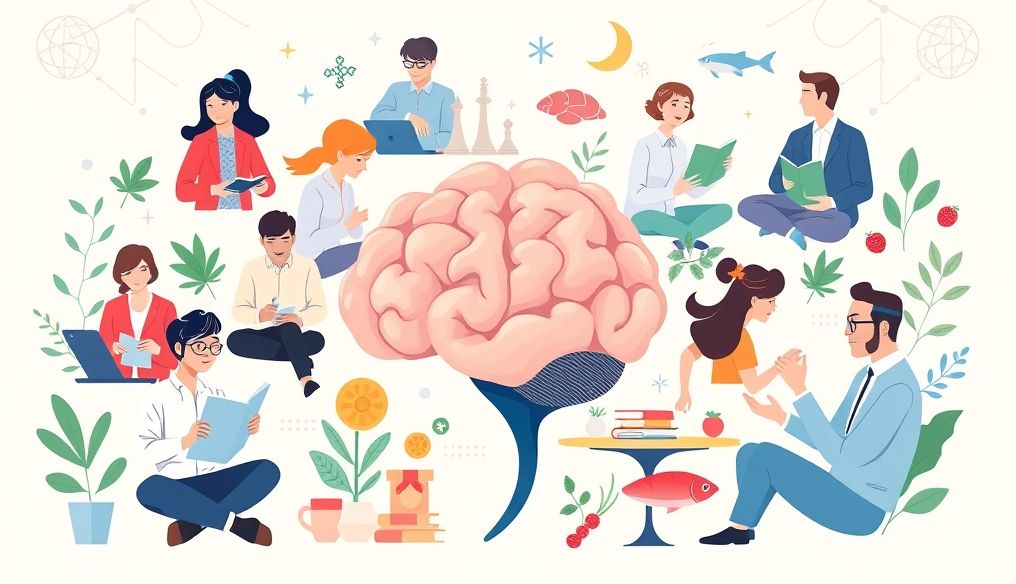What are the Best Mental Exercises to Maintain Brain Health and Boost Memory?
The brain, this incredible organ, is the control center for everything we do. Just like the body, the brain needs regular exercise to stay healthy and strong. As we age, brain function may begin to decline, but the good news is that there are many mental exercises that can help keep your mind sharp and boost your memory.
1. Puzzles and Brain Games
Puzzles and brain games are a great way to stimulate the brain and improve cognitive function. These games include:
- Crossword Puzzles: Help improve vocabulary and critical thinking.
- Sudoku: Enhances logic and concentration.
- Memory Games: Improve short-term memory.
- Chess: Develops strategic thinking and problem-solving skills.
- Video Games: Some games can improve reaction time and visuospatial skills.
Example: Try solving a Sudoku puzzle daily or playing a memory game online. Even 15-30 minutes of these activities can make a noticeable difference.
2. Learning New Skills
Learning a new skill challenges the brain and helps create new neural connections. This skill can be anything, such as:
- A New Language: Improves memory and problem-solving abilities.
- A Musical Instrument: Enhances hand-eye coordination and auditory memory.
- Painting or Sculpting: Stimulates creativity and visual thinking.
- Programming: Develops logic and analytical skills.
Example: Enroll in a language course or start learning to play the guitar. It doesn't matter how difficult the skill is, the important thing is the challenge it poses to the brain.
3. Reading and Writing
Reading and writing are activities that stimulate the brain and help improve language and thinking. These activities can include:
- Reading Books and Articles: Expands knowledge and improves vocabulary.
- Creative Writing: Stimulates imagination and self-expression.
- Journaling: Helps organize thoughts and improve memory.
- Writing Letters or Blogs: Enhances communication and critical thinking.
Example: Set aside time each day to read, even if it's just for a few minutes. Try writing a short story or jotting down your thoughts in a journal.
4. Regular Physical Activity
Physical activity is not only beneficial for the body but also for the brain. Exercise increases blood flow to the brain and stimulates the growth of new nerve cells. Exercises beneficial for the brain include:
- Walking: Improves blood circulation and reduces the risk of cardiovascular disease.
- Running: Boosts the release of endorphins, which improve mood and reduce stress.
- Swimming: A comprehensive exercise that improves physical and mental fitness.
- Yoga: Reduces stress and improves concentration.
Example: Try to exercise for at least 30 minutes most days of the week. You can walk in the park, jog in the neighborhood, or practice yoga at home.
5. Healthy Nutrition
Healthy nutrition plays a crucial role in brain health. Some foods can boost brain function and protect against cognitive decline. Foods beneficial for the brain include:
- Fatty Fish: Rich in omega-3 fatty acids, which support brain health.
- Berries: Contain antioxidants that protect brain cells from damage.
- Nuts and Seeds: Provide healthy fats, protein, vitamins, and minerals.
- Green Leafy Vegetables: Rich in vitamins and minerals that support brain function.
- Green Tea: Contains antioxidants and caffeine, which improve concentration and memory.
Example: Eat a serving of fatty fish at least once a week. Add berries and nuts to your breakfast and eat plenty of green leafy vegetables in your meals.
6. Adequate Sleep
Adequate sleep is essential for brain health. During sleep, the brain processes information and stores memories. Lack of sleep can negatively affect memory, concentration, and mood. Aim for 7-8 hours of sleep each night.
7. Social Interaction
Social interaction stimulates the brain and improves mood. Spending time with friends and family can reduce stress and improve mental health. Join clubs or groups with shared interests or volunteer in your community.
8. Meditation and Mindfulness
Meditation and mindfulness can help reduce stress and improve concentration. Practicing meditation regularly can change the structure and function of the brain, leading to improved memory and attention. Set aside a few minutes each day to practice meditation or mindfulness.
In summary, maintaining brain health requires following a healthy lifestyle that includes mental and physical exercise, healthy nutrition, adequate sleep, social interaction, and meditation. Start today to incorporate these activities into your daily routine and enjoy the benefits of a healthy and strong brain.




